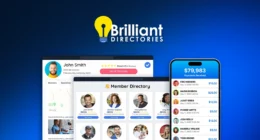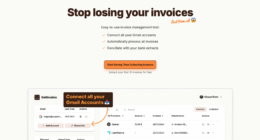Enterprise marketing automation software combines advanced technology with strategic marketing capabilities to streamline and optimize marketing tasks across multiple channels. These platforms offer essential features like AI-driven personalization, workflow automation, and extensive analytics to enhance customer engagement and operational efficiency. Popular solutions like Marketo, Salesforce, and HubSpot provide robust tools for email campaigns, lead nurturing, and CRM integration. Organizations typically see significant improvements in revenue generation and campaign performance through automated processes. Exploring specific platform features reveals how they can transform marketing operations.
Quick Overview
- Enterprise marketing automation software combines AI-driven personalization with multi-channel campaign management to optimize marketing operations at scale.
- Popular solutions include Marketo Engage, Salesforce Marketing Cloud, Oracle Eloqua, HubSpot, and Brevo Enterprise.
- These platforms automate routine marketing tasks, reducing costs and human error while increasing revenue through targeted campaigns.
- Key features include advanced personalization, workflow automation, data unification, CRM integration, and comprehensive analytics capabilities.
- Implementation requires clear objectives, thorough needs assessment, robust data management, and comprehensive team training for successful deployment.
Understanding Enterprise Marketing Automation

Every successful enterprise faces the challenge of managing complex marketing operations at scale. Enterprise marketing automation software provides a powerful solution by streamlining repetitive tasks and optimizing resource allocation across large organizations.
At its core, enterprise marketing automation combines sophisticated technology with strategic marketing practices to:
- Execute multi-channel campaigns efficiently
- Deliver personalized customer experiences
- Track campaign performance with detailed analytics
- Automate routine marketing tasks
- Improve collaboration between departments
The technology proves particularly valuable across various industries, from e-commerce to healthcare, where it helps organizations manage large-scale marketing efforts while maintaining compliance and security standards. Popular platforms like Salesforce and HubSpot have become essential tools for minimizing manual effort in marketing operations.
Marketing automation empowers diverse industries to scale their operations while ensuring robust compliance and security protocols remain intact.
With reported ROI increases of over 400%, these systems enable marketing teams to focus on strategic activities while automated processes handle day-to-day tasks, making them essential tools for modern enterprises.
Essential Features and Capabilities
Building upon the foundation of enterprise marketing automation, successful implementation depends on a robust set of features that power large-scale marketing operations. These essential capabilities encompass five core areas: advanced personalization, multi-channel campaign management, data unification, integration capabilities, and workflow automation. The system is designed to support cross-functional collaboration across marketing teams and departments.
Modern marketing automation platforms excel at delivering tailored content through AI-driven insights and predictive analytics. They seamlessly coordinate messaging across various channels while maintaining brand consistency. The software centralizes data from multiple sources, providing real-time analytics and actionable insights through customizable dashboards.
Enterprise-grade solutions offer scalable integration with existing tools like CRM systems, while ensuring regulatory compliance. Additionally, automation features streamline repetitive tasks through intuitive workflow builders, chatbots, and automated event management, greatly improving operational efficiency.
Benefits for Business Growth and Efficiency

Modern businesses implementing marketing automation software experience profound benefits across their entire operational spectrum. The technology drives growth by automating repetitive tasks, allowing teams to focus on strategic initiatives while reducing operational costs and human error.
Companies see significant improvements in customer engagement through hyper-personalized messaging and real-time communications. Automated email campaigns deliver 320% more revenue than traditional manual marketing efforts. The software streamlines sales processes by automating lead generation, scoring, and nurturing activities, which shortens sales cycles and improves conversion rates.
Data-driven decision-making becomes more accessible as these platforms centralize customer information and provide actionable insights. Additionally, businesses gain a competitive edge through scalable operations that can handle complex marketing campaigns across multiple channels. This scalability, combined with consistent brand messaging and faster market responses, positions organizations for sustainable growth in their respective industries.
Best Practices for Implementation
While marketing automation tools offer significant advantages, successful implementation requires careful planning and strategic execution. Organizations must start by clearly defining their automation objectives and aligning them with broader business goals. This foundation allows teams to select the right platform based on essential features, scalability, and integration capabilities. The integration of CRM systems enables seamless data flow between marketing and sales teams for enhanced lead management.
Key implementation best practices include:
- Conducting thorough needs assessments before platform selection
- Establishing robust data management protocols and privacy compliance measures
- Creating detailed implementation plans with specific timelines and responsibilities
- Providing in-depth team training and ongoing support
- Implementing regular testing and optimization procedures
Success also depends on proper audience segmentation, customized campaign development, and continuous performance monitoring. Regular evaluation and adjustment of automation strategies guarantee they remain effective and aligned with evolving business needs. Organizations should also strive to provide thorough team training that offers a broad view of the system’s capabilities to support business operations effectively.
Popular Software Solutions and Comparisons

Today’s marketing automation landscape offers diverse software solutions tailored to meet varying business needs and objectives. Leading platforms like Marketo Engage, Salesforce Marketing Cloud, and Oracle Eloqua provide robust features for enterprise-level marketing automation. Each solution brings unique strengths to the table, from advanced lead management to AI-powered personalization. HubSpot delivers an integrated approach with its all-in-one platform that combines marketing automation with comprehensive CRM capabilities.
| Platform | Key Strength | Best For |
|---|---|---|
| Marketo | Lead Nurturing | Long Sales Cycles |
| Salesforce | Cross-Channel | Data Unification |
| Oracle Eloqua | B2B Marketing | Sales Alignment |
For businesses seeking thorough solutions, Brevo Enterprise and ActiveCampaign offer alternatives with varying levels of complexity. Brevo excels in compliance and integration capabilities, while ActiveCampaign provides user-friendly automation tools perfect for SMBs getting started with marketing automation.
Future Trends and Innovations
The future of marketing automation is rapidly evolving through groundbreaking technological advancements and shifting consumer expectations. Key innovations are reshaping how businesses connect with customers, particularly through AI and machine learning capabilities that enable hyper-personalized experiences at scale. Current systems showcase marketing automation ROI by delivering $4.30 in value for every dollar spent.
Emerging technologies like augmented reality and voice interfaces are creating more immersive customer experiences, while blockchain and IoT integration are enhancing security and expanding reach. The rise of metaverse-based campaigns represents a new frontier for automated marketing engagement.
Privacy concerns continue driving innovation, with platforms incorporating advanced compliance features and AI-powered consent management. Meanwhile, sophisticated analytics tools are becoming more intuitive, offering predictive modeling and real-time reporting that help marketers make data-driven decisions while maintaining customer trust and regulatory compliance.
Frequently Asked Questions
How Long Does It Typically Take to See ROI From Marketing Automation?
Most businesses see ROI from marketing automation within 6 months of implementation.
Short-term benefits emerge in the first year, with 65% of companies reporting significant returns through improved efficiency and lead generation. Over three years, businesses typically earn $5.44 for every dollar spent. Success factors include proper staff training, consistent optimization, and mature automation strategies. Companies often experience quick wins like 74% faster campaign setups and 23% shorter sales cycles.
What Percentage of Marketing Teams Successfully Adopt Automation Within Their First Year?
Based on available statistics, approximately 59% of marketing teams adopt automation within their first year, though with varying degrees of success.
This breaks down into 25% achieving extensive implementation and 34% adopting automation to a limited degree. While adoption intentions are high, with over 60% of marketers viewing automation as vital, common barriers like limited tool knowledge and budget constraints can impact first-year success rates.
Can Marketing Automation Replace Human Marketers Completely?
Marketing automation cannot completely replace human marketers. While automation excels at handling repetitive tasks, data analysis, and basic customer interactions, it lacks essential human capabilities.
These include emotional intelligence, creative storytelling, strategic thinking, and authentic relationship building. Automation serves best as a tool that enhances human marketers’ capabilities rather than replacing them entirely.
The future of marketing relies on a synergistic relationship between automation technology and human expertise.
Which Industries Have the Highest Success Rates With Marketing Automation?
While some might think traditional industries lead in marketing automation, it’s actually the tech sector that’s crushing it. Technology and software companies report the highest success rates, with an impressive 72% effectiveness rate and ROI averaging 544%.
E-commerce follows closely behind, particularly excelling in cart abandonment workflows. The financial sector shows strong performance too, with 76% of automated emails achieving higher open rates than manual campaigns.
How Often Should Marketing Automation Strategies Be Reviewed and Updated?
Marketing automation strategies require a multi-tiered review schedule for peak performance. Monthly reviews should focus on key metrics like open rates and conversions, while quarterly assessments facilitate more in-depth trend analysis and seasonal adjustments. Weekly operational checks guarantee system reliability, and annual audits evaluate overall strategy alignment.
Additionally, event-driven reviews should occur when significant changes arise, such as declining performance metrics or shifts in market conditions.
Conclusion
Enterprise marketing automation software stands as a digital compass, guiding businesses through the complex landscape of modern marketing. Like a well-oiled machine, it transforms scattered marketing efforts into streamlined campaigns that deliver measurable results. As technology evolves, these platforms will continue to adapt, offering smarter solutions and deeper insights. Organizations that embrace these tools position themselves to navigate the future of marketing with confidence and precision.








